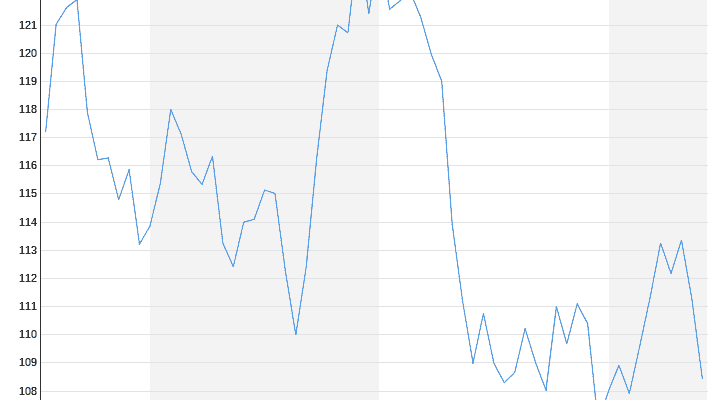Recession fears persist
Poor bank balance sheets depress US indices
07/14/2022 10:34 p.m
The fear of even more sharply rising interest rates with negative effects on economic development and the attractiveness of stocks remains. The US standard values are trading with a slight minus. The euro, on the other hand, was able to slow down its downward trend somewhat.
A weak start to the reporting season by the banking industry discouraged investors on Wall Street on Thursday. On Wall Street, he has Dow Jones given in. The leading US index lost 0.5 percent to 30,630.17 points. The tech-heavy one Nasdaq was hardly changed at 11,251.19 points and the broad S&P 500 lost 0.3 percent to 3,790.38 points.
Higher provisions for impending loan losses due to the increasing risk of recession squeezed profits at the largest US bank JP Morgan in the second quarter. Shares fell 3.4 percent to a one-and-a-half-year low. Chief Executive Jamie Dimon highlighted several risk factors in his outlook, including geopolitical tensions, high inflation, dwindling consumer confidence and “unprecedented” quantitative monetary tightening as a threat to global economic growth. Also MorganStanley disappointed investors with a drop in sales and profits. The titles were around 0.4 percent weaker. The shares of the financial institutions Wells Fargo, Goldman Sachs and Citigroup also fell under the wheels and lost up to three percent. The industry index fell to its lowest level since December 2020.
“As for the things you don’t want to see, you pretty much have it all: the lack of sales and profits, the cutbacks in buybacks and the increase in credit reserves. All things that put ‘Schotten den’ on its way into a recession and a short-term slack in demand in the first half of the year,” said Thomas Hayes, Managing Director at Great Hill Capital.
Stockbrokers expect further interest rate hikes
The US inflation figure for June, which surprisingly rose sharply on Wednesday, continued to get on the nerves of investors. Speculations that the US Federal Reserve would take aggressive countermeasures fueled fears of an economic crash. Producer prices also rose more than expected, up 1.1 percent on the previous month. Some stockbrokers are expecting a full percentage point hike at the US Federal Reserve meeting in two weeks. This prospect gave the world’s leading currency a boost. Of the dollar indexwhich reflects the rate against major currencies, rose by around 0.6 percent to a 20-year high of 108.64 points.
Of the Euro meanwhile fell below the parity to the dollar again to 0.9950 dollars, was again at 1.0014 € at the close of the market. The government crisis in Italy also caused a stir, culminating in Prime Minister Mario Draghi announcing his resignation. After that, the sell-off in the country’s government bonds accelerated again.
Continued dollar strength sent that gold price plummeting because it makes the precious metal less attractive to non-US investors. Gold fell 1.4 percent to $1,710 an ounce (31.1 grams). In the case of copper and crude oil, the looming recession was an additional negative factor. The industrial metal lost 1.4 percent to $7,266 a ton and the Brent oil from the North Sea lost 1.3 percent to $98.58 a barrel (159 liters).
Shares in the copper industry came under pressure because of the price slide. So fell Global X Copper Miners ETF by five percent, shares of the largest listed copper producer Freeport-McMoRan also by more than five percent. The mining corporations Rio Tinto and BHP Group slipped 4.7 and 4.2 percent respectively. shares in the food company Conagra Brands lost more than seven percent after a full-year forecast came in below expectations. The group is suffering as price increases are slowing demand for frozen foods and snacks.
